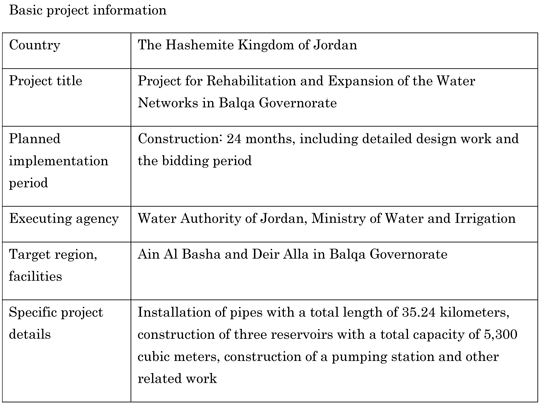[Japan International Cooperation Agency] [Friday, Nov 28, 2014]
JICA Conducts Aerial and Field Surveys of Deadly Landslide Site in Sri Lanka
JICA teams conducted aerial and field surveys of a landslide that killed at least 16 people in October in the village of Koslanda, Sri Lanka.
The field survey was conducted Nov. 19 and 20 by three landslide experts from a JICA project to identify the scale and mechanism of the landslide and suggest measures including infrastructural restoration.
The aerial survey was conducted on Nov. 5, a week after the 3-kilometer landslide was caused by monsoon rains.
The Sri Lankan Ministry of Disaster Management has no helicopters, so the aerial survey was new to it and served as on-the-job training for government employees.
The aerial survey investigators included JICA project members, and two trainees, one each from Sri Lanka's Disaster Management Center and National Building Research Organization.
In Japan, soon after the occurrence of a large-scale disaster, disaster-management authorities deploy a helicopter to the site to observe the overall situation and to identify the risks of secondary disasters. These observations are then used for decision-making by the emergency operation center. At the same time, relevant authorities deploy field survey teams to assess the disaster and identify lessons for enhancing disaster risk reduction capacity.
Since post-disaster efforts mainly have focused on search and rescue in Sri Lanka, these kinds of surveys rarely have been conducted.
JICA and the government of Sri Lanka will use the experience of this tragedy for further strengthening the government's disaster risk reduction capacity.
*The contents of this story is based on the below reports and press release published by the JICA Sri Lanka office.
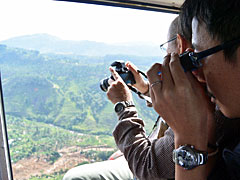 Aerial survey
Aerial survey
[Japan International Cooperation Agency] [Wednesday, Nov 26, 2014]
Signing of Grant Agreement (G/A) with Uganda on the Project for Improvement of Queensway Substation
On November 25th, the Japan International Cooperation Agency (JICA) signed a grant agreement (G/A) with the Government of the Republic of Uganda to provide grant aid of up to 2,519 million yen for the Project for Improvement of Queensway Substation.
This project will install 132/33 kilovolt transformer equipment and gas-insulated switchgears to effectively use land for a smaller footprint at the Queensway substation constructed in the capital of Kampala in 1991 and 1992 with grant aid from the Government of Japan. In addition, this project will improve the power supply to the city core, stimulate urban economic activities and improve residents’ living standards.
With economic growth high in recent years, about 7 percent per year, the power demand is undergoing increases around 10 percent per year in Uganda. Given this situation, the Government of Uganda aims to strengthen the power generating capacity and construct power plants, but the infrastructure for power distribution has fallen behind. In the Greater Kampala metropolitan area, despite the high demand placed on existing facilities, land restrictions and related issues have become obstacles to expanding power transmission and distribution, resulting in frequent power outages that impact the government work, economic activities and the lives of residents.
This project will improve the facilities by installing gas-insulated switchgears to overcome the land restrictions and increasing the transformation facility capacity at the 132-kilovolt voltage level by 120 megavolt-amperes in the Kampala metropolitan area (actual level achieved in 2014: 460 megavolt-amperes). This is also expected to alleviate the rolling blackouts. In addition to this project, JICA is funding both the Bujagali Interconnection Project and the Interconnection of Electric Grids of Nile Equatorial Lakes Countries Project with loan aid to support the promotion of economic growth through power infrastructure.
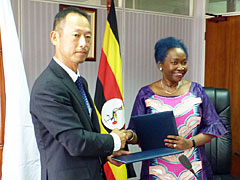 Maria Kiwanuka, minister of Finance, Planning and Economic Development, right, and Kyosuke Kawazumi, chief representative of the JICA Uganda Office
Maria Kiwanuka, minister of Finance, Planning and Economic Development, right, and Kyosuke Kawazumi, chief representative of the JICA Uganda Office 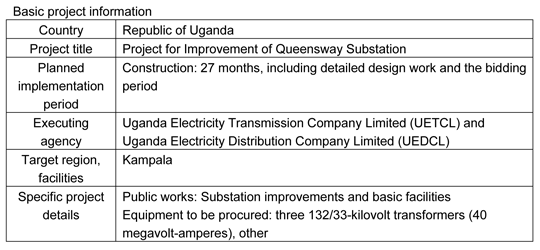
[Japan International Cooperation Agency] [Wednesday, Nov 26, 2014]
Signing of Grant Agreement with the Hashemite Kingdom of Jordan for Rehabilitation and Expansion of the Water Networks in Balqa Governorate
On November 26, the Japan International Cooperation Agency (JICA) signed a grant agreement (G/A) with the Government of the Hashemite Kingdom of Jordan to provide grant aid of up to 2.238 billion yen (equivalent to approximately 20 million USD) for assistance for the Project for Rehabilitation and Expansion of the Water Networks in Balqa Governorate. This agreement was signed as a follow-up of the Exchange of Notes which was signed on November 20 during King Abdullah 2nd visit to Japan.
By improving and upgrading the water supply systems, the project aims to improve the state of water supply, reduce water losses in the network and decrease electricity consumption in Deir Alla and in Ain Al Basha, where some of the water is supplied from the Zai Treatment Plant which was expanded with a Japanese grand aid project totaling 7.422 billion yen (equivalent to approximately 70 million USD) in 2001.
This project will install 35.24 kilometers of pipes, construct three reservoirs with a total capacity of 5,300 cubic meters, construct a pumping station and carry out related work. The expected number of beneficiaries from this project is around 167,000 people.
In Jordan, the water demand far exceeds the supply. One of the largest energy consumers, the water sector uses more than 18 percent of the electricity generated in Jordan. Therefore, it is of fundamental importance to improve waterworks management, and achieve the objectives of this project. Working with this perspective, JICA has been implementing several rehabilitation, improvement and expansion waterworks studies and projects throughout Jordan, including in Amman, Zarqa, the Jordan Valley, Tafieleh and recently the northern governorates which are affected by the influx of Syrian refugees, aiming at improving the availability and reliability of the water supply as well as reducing energy consumption. So far, JICA has provided 21.113 billion yen (equivalent to approximately 200 million USD) in total as grant aid for implementing projects in the water sector.
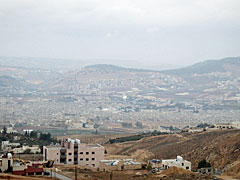 Target Area (Ain Al Basha)
Target Area (Ain Al Basha) 